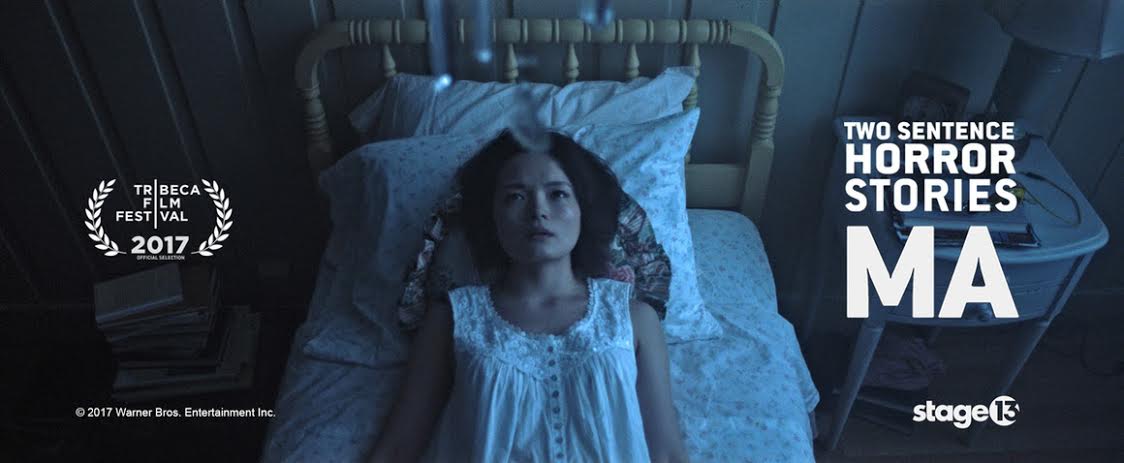Two Sentence Horror Stories is an anthology series that absolutely struck me and is gearing up to be a new favorite for the internet age. Created, written, executive produced, and directed by Vera Miao, the series is based on the viral short fiction that began on Reddit, and will appear on”will appear digitally this summer. I had a chance to watch the first episode “MA” and talk to Miao about her approach and experience as an Asian American queer filmmaker.
As a life-long fan of horror, Miao loved reading the two-sentence stories that she says have “a classic ghost story” feeling mixed with a high-technology environment on the internet. The set-up of the first sentence and the twist of the second has a kind of open-ended format, which she said inspired her to fill in the blanks of what happened before, in-between, and after those words. “MA” begins with the sentence, “‘I love you,’ I whispered, hugging Mom close” and is 15-minutes of creepy delight.
Pitching the series, Miao wanted to use the horror genre “to explore contemporary social issues and centralizing people of color or queer people in those stories.” Each episode grapples with a social issue in our diverse and modern world. Miao says she loves horror as an elevated art form “because it gets to our primal fears.”
“It gives us the freedom, or the permission to really explore primal fears in a way that I don’t think other genres allow you to,” she explains. “MA” is a perfect way to kick-off the series. Here’s the synopsis to give you an idea of the episode:
“Like many traditional Chinese families, Mona still lives at home with her stern but loving Ma. When she meets cute Erica, their instant chemistry awakens something dormant inside. But Ma is not going to let her daughter go easily. Because nothing is allowed to come between a mother and daughter.”
The love story between Mona (Wei-Yi Lin) and Erica (Ayesha Harris) next to the sinister relationship between Mona and her mother, portrayed with a spine-chilling eeriness by Mardy Ma, kicks off the anthology with a supernatural examination of loneliness. “MA” is one of two episodes directed by Miao, and the one she calls the most personal. What happens when “some part of you always makes you feel like an outsider” and fear of abandonment rules so much of your life? Through several layers, “MA” is about what happens when we deny a fundamental part of who we are, and see something “that can be a strength, an asset, a gift, or a blessing” as a source of shame.
Miao says that while her work isn’t autobiographical, “there’s a lot of influences that come directly from being a child of Taiwanese immigrants.” The first episode, which is 60% in Mandarin Chinese, is full of small details that reflected a lot of my own experience as the child of Taiwanese parents. “That’s my hope, that I can tell really specific stories,” she says, “and because they’re so specific it makes it easier to find that universality of it.” Women of color are so often pressured to water down their stories to be more “universal” for audiences, but Miao shows that’s not the case. In fact, it’s the opposite.
“Their world in that apartment was really special to me,” the director said, talking about how carefully she crafted the look, sound, and feel of MA’s mother-daughter scenes. This episode is split into two worlds—the apartment and the outside—through cinematography, color, and other factors. The mother and daughter speak to each other in a mixture of Chinese and English, Chinese programming plays in the background, and all kinds of Chinese food sits on the table. I was struck by how there’s no need to hand-hold the viewer through these moments, they just exist.
As we talk about shared experiences with cheesy Taiwanese programming and ever-present fans, and Miao points out that I had a different connection with the episode than some non-Taiwanese viewers. I was excited by how I saw a lot of my own upbringing in this story down to small details, but that doesn’t mean the story was exclusive by any means. “It’s always really fascinating to see what people pick up, what strikes them,” says Miao recounting a white man who said he saw elements of his family’s own co-dependency in Mona and her mother’s apartment. Her mother, she says, would likely also have a different connection as a member of the audience that understands the Chinese and not the English portions.
Two Sentence Horror Stories’ first season will be full of “complicated characters really grappling with issues and fears that will feel very timely and present.” Miao says that while it’s an anthology series, every episode feels like part of the same universe.
“Future episodes grapple with racism more explicitly, the impact of new technologies when taken too far, trolling and online bullying, changing beauty standards and how far it goes, objectification of women (particularly women of color) and the horror of that when taken very far.”
(Image: Stage 13)
Want more stories like this? Become a subscriber and support the site!
—The Mary Sue has a strict comment policy that forbids, but is not limited to, personal insults toward anyone, hate speech, and trolling.—









Published: May 1, 2017 03:39 pm